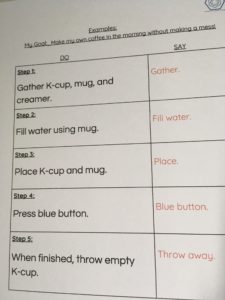Hello SLP’s! It’s clear that the Functional Cognition Series has been resonating with people — with our current knowledge, we need tools that are both evidence-based and easy to implement, Functional and fast to document, Practical, person-centered, and pleasing to the patient! If you haven’t yet, check out my newly-released Book 1: Goal Management Training or Book 2: Step by Step Activities, and stay tuned for Book 3’s release next week (my biggest labor of love for this series!)
Today I’m sharing a Case Example that shows the power and benefit of using a protocol like Step by Step Instruction in therapy to meet real life goals.
Psst: In case you are just tuning in, this post is part of the Functional Treatment for Everyday Cognition Series: If you have that deep-down knowledge/feeling that games and worksheets aren’t really cutting it for our neuro patients…. but aren’t sure what else to pass the time with in therapy, then this series if for you! Evidence tells us there are TONS of treatment methods we can apply to make a functional difference in our patients’ lives!
As a refresher, Book 2: Step-by-Step Activities looks at increasing activity and participation by training specific daily tasks for those with cognitive impairments due to brain injury or learning disabilities. Best practices include a step-by-step instruction method and errorless learning principles, which are integrated with personally relevant needs, for those with moderate or severe cognitive impairments.
This book specifically includes functional need ideas organized by activity category and setting– Let’s look at 1 case example to see how it could be used (There are 40+ other functional need ideas in Book 2 across treatment settings!)
Case Example: The patient has severe cognitive-communication deficits due to glioblastoma diagnosis. She is now at home, undergoing weekly radiation, but has a terminal diagnosis. Both patient and significant other spend time crying in evaluation due to shock of prognosis and patient’s frustration with her inability to complete familiar tasks (they mention knowing the date, making coffee with coffee maker, and feeding pet). Score on Montreal Cognitive Assessment is 10/30, with memory, problem-solving, attention, organization, and executive function challenges. Language skills relatively intact but impacted by cognitive deficits.
The question: What do we spend time actually doing in therapy with this case?
Option 1: Non-Functional Therapy Tasks: Play board games or card games — maybe this will help patient pass the time? Reduce boredom? Be “Cognitively stimulating”?
Sarah’s Thoughts on Option 1: Person-centered care is about more than someone just enjoying a game or “stimulating cognition” — it’s about helping each person enjoy meaningful life and maintaining or increasing sense of self and independence. Unless the evaluation revealed that the patient / significant other were disappointed with patient’s inability to play a game, I would not choose games or cards as a treatment stimuli. This comes from research that tells us that those with moderate or severe cognitive impairments are NOT likely to generalize practice to other environments. So, even if the patient “improves” at Solitaire in this case, there is no connection that tells us she would improve with making her coffee in the morning.
Option 2: Use Step-by-Step Training to improve independence with making coffee in the morning.
Sarah’s Thoughts on Option 2: This option jumps right to the heart of one of the functional activities that the patient and significant other described as a painful part of lost meaning in their daily lives. As described in Book 2: Step-by-Step Activities, this is an effective training method for moderate and severe impairments for learning new knowledge or activities in daily life, so the patient matches the profile. Using this treatment method is about more than a hot cup of coffee: It’s about dignity, meaningful activity, social connection with significant other, life participation, patient satisfaction! This could also serve as a “training” for the significant other to help coach step-by-step training for other meaningful activities that may arise with progression of patient’s terminal diagnosis.
Are you choosing the best options in your therapy time? Purchase Book 1: Goal Management Training or Book 2: Step by Step Activities in my store, and stay tuned for multiple other parts to this series!
Blog posts in this series:
Why Functional Treatment for Everyday Cognition Matters
More About Book 1: Goal Management Training
Goal Makeovers using Book 1: Goal Management Training
More About Book 2: Step by Step Activities
Make sure you get the latest functional therapy updates: Follow Honeycomb Speech Therapy on Facebook , Pinterest, or Instagram, or sign up for email updates below.
